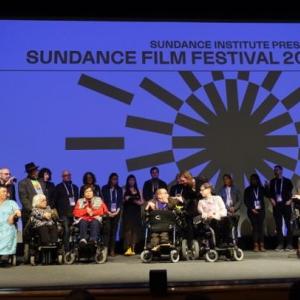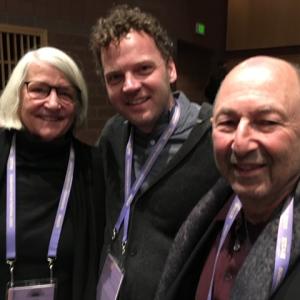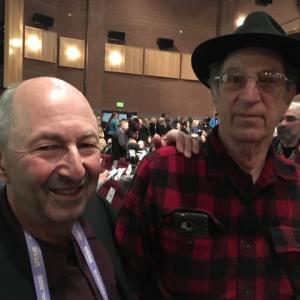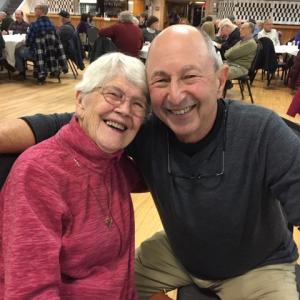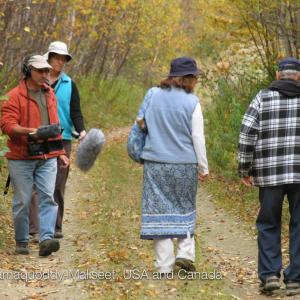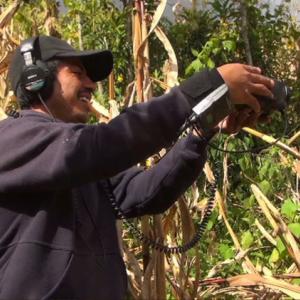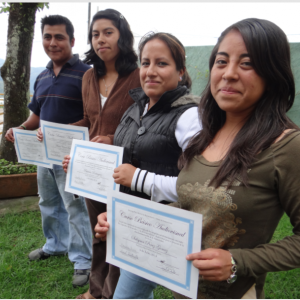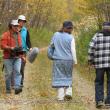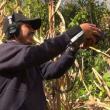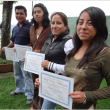Creating social change from Maine to Mexico, with a stop at Sundance Film Festival
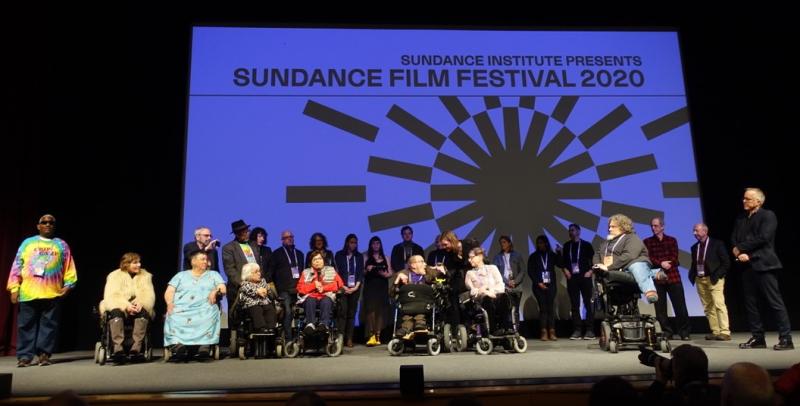 The Sundance stage, Jan. 23, 2020. (Photo courtesy Julia Schulz0)
The Sundance stage, Jan. 23, 2020. (Photo courtesy Julia Schulz0)
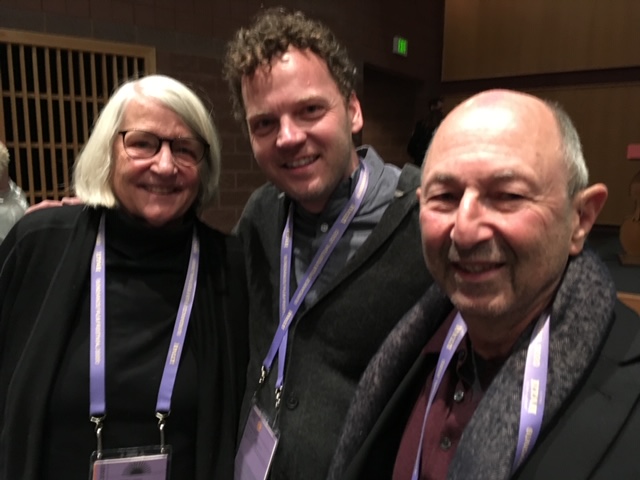 Mary Lampson, Shane Hofeldt, Ben Levine. (Photo courtesy Julia Schulz)
Mary Lampson, Shane Hofeldt, Ben Levine. (Photo courtesy Julia Schulz)
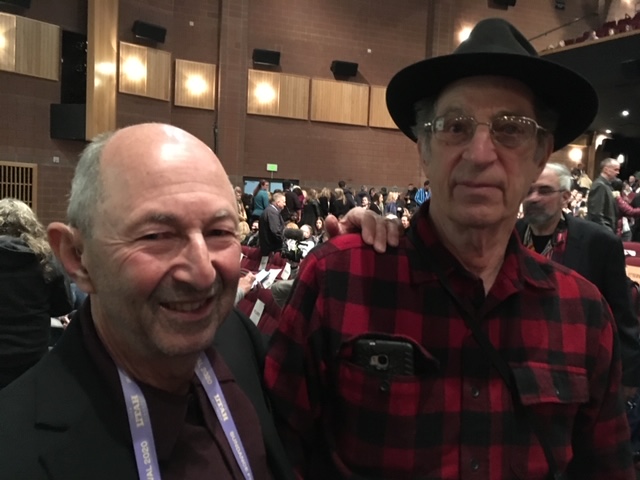 Ben Levine and Howard Gustadt. (Photo courtesy Julia Schulz)
Ben Levine and Howard Gustadt. (Photo courtesy Julia Schulz)
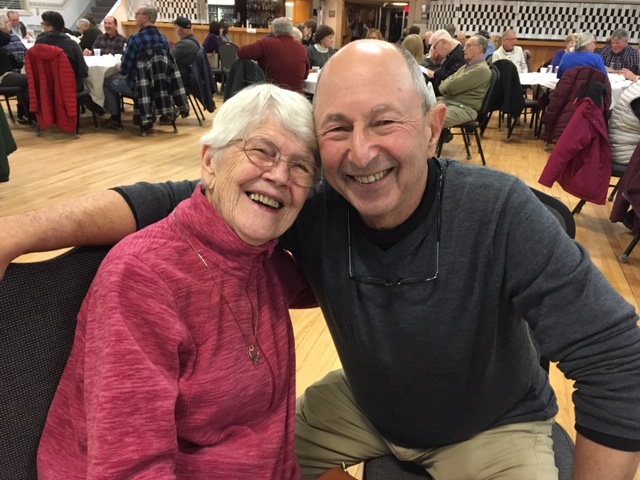 Ben Levine with Cécile Vigue at recent show of his film "Réveil-Waking Up French" (2003). Cécile and her late husband Alcée were important community participants in the revival of French speaking in Waterville (Photo courtesy Julia Schulz)
Ben Levine with Cécile Vigue at recent show of his film "Réveil-Waking Up French" (2003). Cécile and her late husband Alcée were important community participants in the revival of French speaking in Waterville (Photo courtesy Julia Schulz)
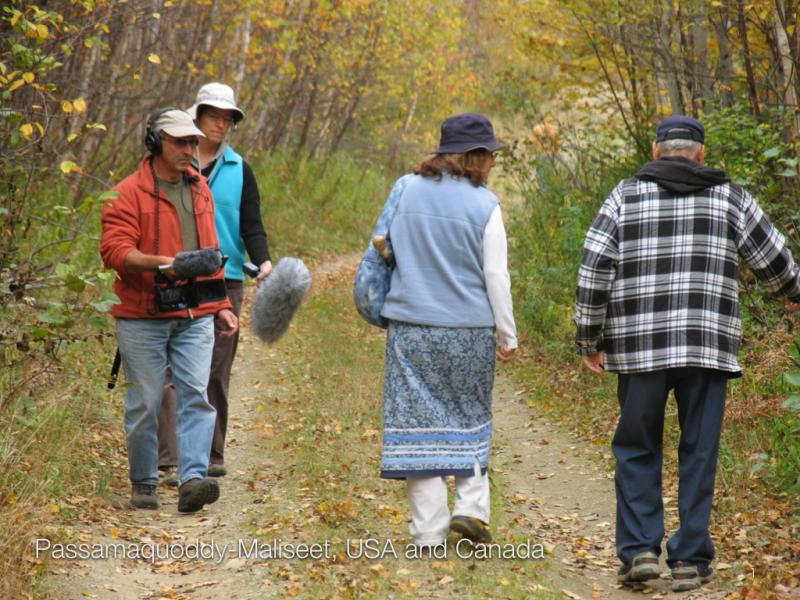 Ben Levine and Julia Schulz filming Passamaquoddy-Maliseet as it's naturally spoken, an early step in language revival. (Photo courtesy Speaking Place)
Ben Levine and Julia Schulz filming Passamaquoddy-Maliseet as it's naturally spoken, an early step in language revival. (Photo courtesy Speaking Place)
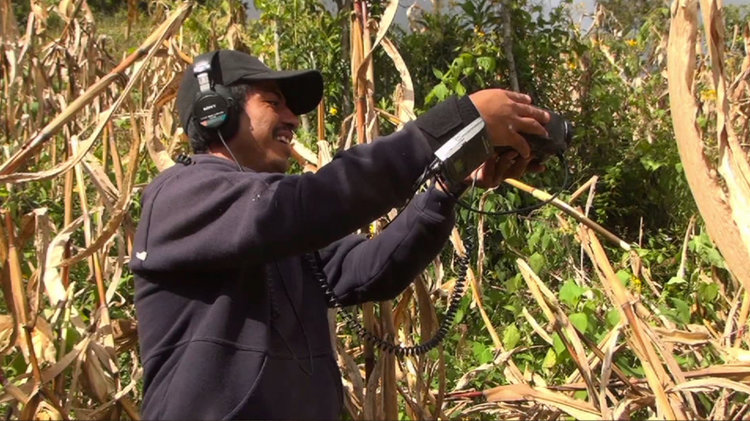 Video documentation of traditional Totontepec corn cultivation helped scientists crack a scientific mystery. (Photo courtesy Speaking Place)
Video documentation of traditional Totontepec corn cultivation helped scientists crack a scientific mystery. (Photo courtesy Speaking Place)
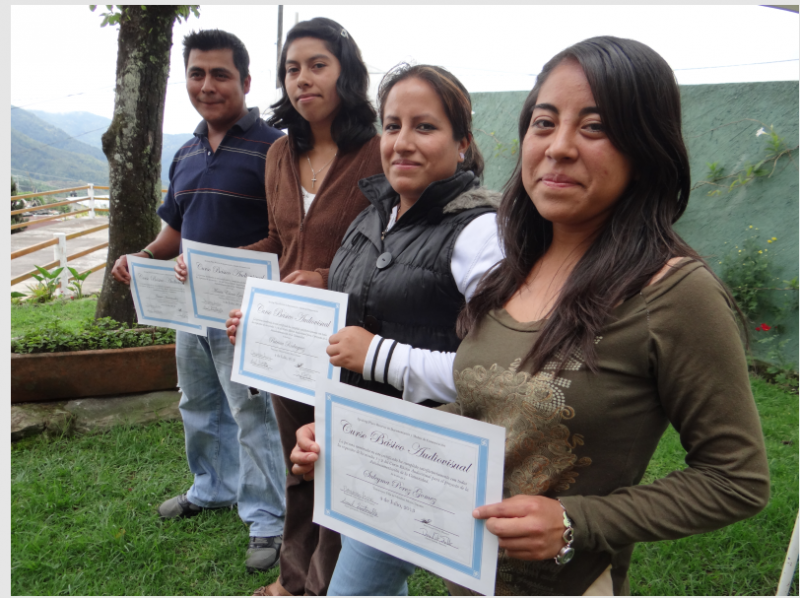 The first documentary video trainees from Totontepec. (Photo courtesy Speaking Place)
The first documentary video trainees from Totontepec. (Photo courtesy Speaking Place)
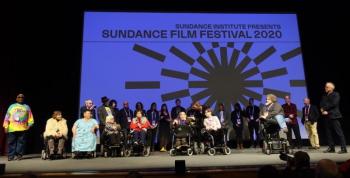 The Sundance stage, Jan. 23, 2020. (Photo courtesy Julia Schulz0)
The Sundance stage, Jan. 23, 2020. (Photo courtesy Julia Schulz0)
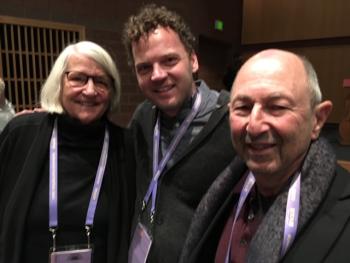 Mary Lampson, Shane Hofeldt, Ben Levine. (Photo courtesy Julia Schulz)
Mary Lampson, Shane Hofeldt, Ben Levine. (Photo courtesy Julia Schulz)
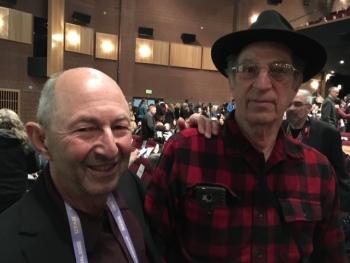 Ben Levine and Howard Gustadt. (Photo courtesy Julia Schulz)
Ben Levine and Howard Gustadt. (Photo courtesy Julia Schulz)
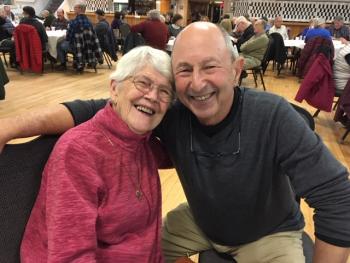 Ben Levine with Cécile Vigue at recent show of his film "Réveil-Waking Up French" (2003). Cécile and her late husband Alcée were important community participants in the revival of French speaking in Waterville (Photo courtesy Julia Schulz)
Ben Levine with Cécile Vigue at recent show of his film "Réveil-Waking Up French" (2003). Cécile and her late husband Alcée were important community participants in the revival of French speaking in Waterville (Photo courtesy Julia Schulz)
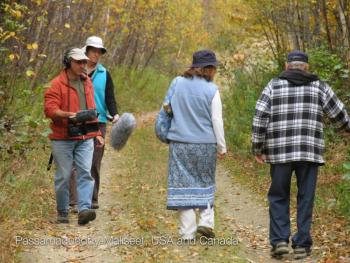 Ben Levine and Julia Schulz filming Passamaquoddy-Maliseet as it's naturally spoken, an early step in language revival. (Photo courtesy Speaking Place)
Ben Levine and Julia Schulz filming Passamaquoddy-Maliseet as it's naturally spoken, an early step in language revival. (Photo courtesy Speaking Place)
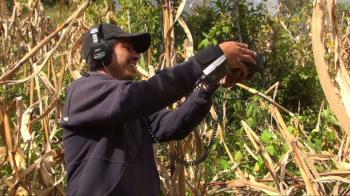 Video documentation of traditional Totontepec corn cultivation helped scientists crack a scientific mystery. (Photo courtesy Speaking Place)
Video documentation of traditional Totontepec corn cultivation helped scientists crack a scientific mystery. (Photo courtesy Speaking Place)
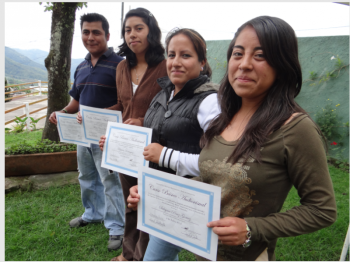 The first documentary video trainees from Totontepec. (Photo courtesy Speaking Place)
The first documentary video trainees from Totontepec. (Photo courtesy Speaking Place)
A filmmaker who cofounded the Rockland-based organization, Speaking Place, was honored Jan. 23 at the 2020 Sundance Film Festival for a documentary film created almost 50 years ago entitled Crip Camp. And that film, which earned the U.S. Documentary Audience Award at Sundance less than a month ago, will open next weekend’s Cabin Fever Film Festival in Camden. (See Cabin Fever Film Festival returns to Camden Opera House)
Speaking Place cofounders and codirectors Julia Schulz and Ben Levine define their effort as a ‘media-based catalyst’ organization. They work internationally to address critical issues facing communities. Their principal focus is on documenting and reviving endangered languages, addressing a worldwide trend that has reached crisis proportions.
In 1971, Levine and his early video partner Howard Gutstadt began videotaping at Camp Jened, a camp for disabled teens in the Catskills. Levine, who had been trained as a clinical psychologist, was now a principal in a New York City video collective called ‘People’s Video Theater,’ which later became Survival Arts Media. The collective was introducing a brand-new medium with the capacity that no former visual medium had: to immediately play back the recording.
“I had already seen video change minds,” said Levine, in a news release. “And I had developed an instinctive understanding that the process we developed, what we called Video Feedback, could amplify and accelerate underlying but difficult to express group intention.”
At Camp Jened the challenge was to overcome dependency. The teens grasped the opportunity to speak for themselves and began to define the lives they wanted to live. Many of them, now armed with a new awareness and voice from their experience with video feedback, went on to form the core of the disability rights movement, educating, making policy, empowering young and old to change the lives of all Americans. This is the story told in Crip Camp, directed by Nicole Newnham and Jim LeBrecht.
Levine arrived in Maine in 1975 to head up the first video studio in the state at the University of Maine in Augusta. He became interested in French culture and wanted to improve his school French with people of French-Canadian descent, but was told one day in a local laundromat, “Oh, no, I can't—you speak the good French.”
As a former clinical psychologist, Levine could hear the shame in her voice, but why?
Enter Julia Schulz, Levine’s French teacher, and co-founder and past president of the internationally recognized Penobscot School, where she had developed innovative immersion language teaching methods. Together they tried an experiment: they showed Levine's first film about the French of New England and other Quebec-based films to Franco-Americans at Waterville’s Railroad Square Cinema.
After each showing, they facilitated an audience discussion, filming it and later showing back an edited version.
Employing the same video feedback method elaborated at Camp Jened in 1971, audience members began to voice the emotional history of their community and expressed their desire to want to live their French language and culture once again.
Levine's feature-length documentary, Réveil - Waking Up French, grew out of this process. In 2003, Levine was elected to the Franco-American Hall of Fame by the Maine State Legislature for Réveil and Si je comprends bien…., which are credited with French language revival in New England.
Building on four decades of experience, Speaking Place’s interdisciplinary teams work closely with communities to train local partners in the use of innovative, media-based language revival methods. The results often lead to positive social change.
“When you see people opening emotionally, becoming aware, and taking action…that’s the process that drives us,” said Schulz, in the release.“Speaking Place has become a media-based innovation laboratory for creating social change on a small scale, applicable anywhere.”
Meanwhile, Passamaquoddy language activists saw Réveil - Waking Up French at the first Camden International Film Festival and asked Levine to make a film "to help us revive our language.”
Levine and Schulz developed a collaborative approach using the feedback filmmaking techniques to document the language as it was naturally spoken.
Levine said, "As people started to hear the language again it spread a lot of joy, and this created a ripple effect that continues to this day."
With funding from the National Science Foundation, the community and Speaking Place made over 100 videos in Passamaquoddy and built the first online language portal to link a dictionary with subtitled videos. (www.PMPortal.org). Today there are new speakers of Passamaquoddy for the first time in 50 years.
The ripples began to spread wider. A graduate student from the remote mountain village of Totontepec in Southern Mexico was moved by some of the Passamaquoddy videos that his professor, Passamaquoddy linguist and Speaking Place Board Chair, Robert Leavitt, had shown at his university and asked Levine and Schulz to visit.
In 2009 Levine and Schulz took their camera and video feedback techniques to Totontpec. Later, with grants from the National Science Foundation, Speaking Place trained young Totontepecano adults to be filmmakers. They called the program "Community Self-Documentation." The trainees produced 60 videos in their own media lab and created a language portal. Immersion schools and an Ayöök community radio station followed.
A collaboration with Oaxaca City's largest university, UABJO, began. In early 2019, a pilot workshop called TAVICO brought together participants from indigenous communities around Oaxaca State to learn the Speaking Place approach.
Speaking Place has started a regional approach to language, culture, and community revival using methods that began in 1971 with video feedback at Camp Jened. From there, it has evolved in Maine and beyond, adapting traditions to meet overwhelming globalizing changes anywhere in the world.
Shortly before Crip Camp opened Sundance 2020, the filmmakers received a call from Barack Obama. He wanted them to know how proud he and Michelle were of the film—the second film produced by their new company, Higher Ground Productions.
Just hours later over 1200 people attending the premiere rose in what many say was the longest standing ovation for a film at Sundance in recent memory. And on Feb. 5, Crip Camp opened MoMA’s Doc Fortnight Festival in New York. Netflix will soon release it to 150 countries in 35 languages.
“It’s an incredible turn of events, this footage shot 50 years ago at the dawn of the video age,” said Levine. “We couldn’t even watch it until recently because the machines didn’t exist anymore. But the memory of the methods was there, informing our approach for small-scale social change. And now, against all odds, it’s become the foundation and opening third of a documentary about one of America’s greatest social change stories."
Event Date
Address
United States

